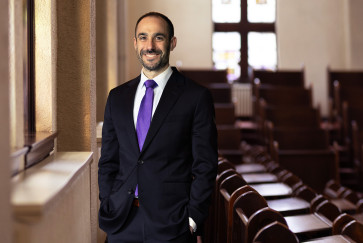Northwestern University President Morton Schapiro and Provost Jonathan Holloway today announced organizational and leadership changes to support the University’s growing research enterprise — and to ensure Northwestern remains a leader among America’s research universities.

Jay Walsh, the University’s Vice President for Research, has been promoted to a new role, Senior Advisor to the President for Research and Science. He will report directly to President Morton Schapiro and will remain part of President Schapiro’s senior staff. The appointment will become effective Oct. 1.
“Perhaps no other university’s research enterprise has grown so dramatically over the past decade,” President Schapiro said. “This is due in no small part to Jay’s ability to help our scholars attract funding for work that explores the major academic frontiers of our time. I’m grateful for his leadership and looking forward to working more closely with him in this new role.”
In Walsh’s new role, he will provide counsel to the President, Provost, Senior Vice President for Business and Finance, and the Vice President for Research on major trends that may impact current or future research efforts.
He also will serve on selected initiatives that represent Northwestern’s interests on local, state, national and international levels.
Walsh will work closely with the special assistant to the president for government relations on legislative issues impacting Northwestern’s research enterprise. Working with the President, Provost, and Vice President for Research, he also will lead research-based special projects and new strategic opportunities.
“Perhaps no other university’s research enterprise has grown so dramatically over the past decade. This is due in no small part to Jay’s ability to help our scholars attract funding for work that explores the major academic frontiers of our time." - President Morton Schapiro
“Jay has been a tireless and innovative advocate for Northwestern’s research enterprise, helping grow our sponsored research funding to nearly $800 million a year and pushing the University into the top ranks of research institutions in the world,” Provost Holloway said. “We are delighted he will continue to advise senior leadership and help shape our strategic planning around research, working to identify trends and opportunities to keep Northwestern research on a solid path to continued expansion that will impact people’s lives.”
In 2007, when Walsh started as Vice President for Research, sponsored awards at Northwestern totaled $416.4 million. This year they were $797.8 million, a 91% increase. The growth has occurred over the past dozen years without any significant citations for non-compliance, despite an increasingly regulated environment.
During his tenure, the core facilities group has grown into a national model providing world-class support with a business model that enables research growth and fiscal sustainability.
When Walsh started as Vice President, the tech transfer office did not report to him. Over the past 10 years, the Innovation and New Ventures Office (INVO) has evolved into a model for the engagement of faculty, post-docs and students in innovative and entrepreneurial society-changing activities with start-ups and established companies.
Along the way, Walsh and his team have been instrumental in recruiting and retaining faculty — both the most senior of recruits and new assistant professors.
When Walsh started in 2007, there were 19 University-wide research institutes and centers (URICs) that reported within the Office for Research. There are now more than 50, and this past year alone, there was a 24% increase in funding for the URICs.
Walsh has also connected the University within the region by serving on the boards of MxD, Current, the Chicago Council on Science and Technology, and Argonne National Laboratory, and across the nation with his presence on the Secretary of Navy’s Advisory Panel and the University Industry Demonstration Partnership board, among others.
He notes that the Office for Research team, which is diverse in its composition and inclusive in its operations, has empowered the faculty to expand their research programs and has enabled collaborations that are inclusive of every school and most every unit at the University.
Walsh joined Northwestern in 1988 as a professor of biomedical engineering at the McCormick School of Engineering and Applied Sciences, where he later served as associate dean for graduate studies and then senior associate dean.
“I look forward to thinking strategically with researchers and leadership across the University, thereby enabling the faculty, post-docs and students to continue to grow their research programs and to have ever more impact within in their fields and more broadly across society,” Walsh said.
Walsh earned his bachelor's and master's degrees in electrical engineering from the Massachusetts Institute of Technology (MIT) and a Ph.D. in medical engineering from a joint Harvard Medical School-MIT program.

